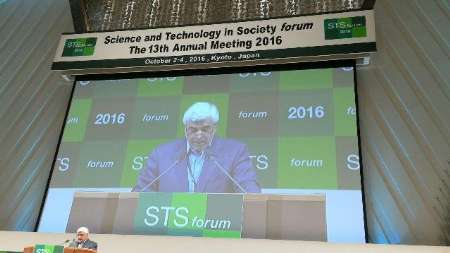
Farhadi made the remarks in an expert panel 'Population and Resources' during the 13th annual meeting of Science and Technology in Society (STS) forum.
He said that there are two currently worldwide problems associated with population and resourses, namely urbanization and talented migration.
'The world cites report', published in 2016 by the United Nations, indicates that by 2030 urban area are anticipated to house about 60% of people globally, and to more than 70% in Iran.
'With over 80 million population, and as a diverse country, Iran ranks 17th in the world in population and consists of different religions and ethnic groups that are living in peace. Sharing its border with 15 countries, Iran hosts about 2.5 million refugees' Farhadi says.
'Due to the impact of brain drain that is also known as human capital flights, on development of a country, and the huge investments made on education and manpower, this has been identified as a global concern. This is caused by the fact that without skilled manpower, sustainable development of a country or a region could not be achieved, and so, brain drain can bring unsustainable development, he added.
'So, we should all think about slowing-down and even reversing the outflow of the population of professionals from 'human capital flights' or 'brain drain' to 'professional mobility' or 'brain circulation'.
'Both the resource and destination countries are responsible for providing support and facilitating the mutual mobility of skilled people, to its mother country, until the transfer of knowledge from professional is possible', he says.
This assists the source countries to benefit from further investments on educating skilled manpower, and transformation of brain drain to brain gain. It is however important to highlight that such transformation needs active global efforts to accelerate this process', he reiterated.
9376**1424
www.irna.ir
 solhkhabar | Peace International News Agency Peace International News Agency , Peace News , International Agency News of Peace
solhkhabar | Peace International News Agency Peace International News Agency , Peace News , International Agency News of Peace